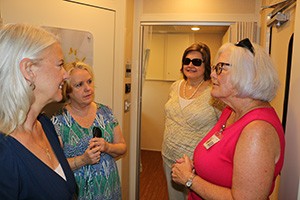
Clinic RN Gloria Risko (right) leads a tour of the clinic for (from left) nurse Kim Carter, Marian Christiana, and Karen Byrne. Photo by Dan McWilliams
The St. Mary’s Legacy Clinic will soon have a new home.
The diocese broke ground July 1 for a 40-by-60-foot warehouse that will house the mobile clinic, which is a family physician’s office on wheels that provides free health care each month to the needy of Washburn, Crab Orchard, and Athens.
Bishop Richard F. Stika and Sister Mariana Koonce, RSM, MD, led the groundbreaking ceremony at the site next to the Church of Divine Mercy on Carmichael Road in West Knoxville. The bishop also blessed the site of the new headquarters.
Joining the bishop and Sister Mariana in breaking ground were Bruce Bosse, president of Merit Construction; Dr. Tony Mardini; Sister Martha Naber, RSM, of Tennova Healthcare; Judy Schmidt, clinic volunteer; and Father Hoan Dinh, pastor of Divine Mercy, which serves the diocese’s Vietnamese Catholic community. Also attending were Brother Andrew Dinegar, CFA, and Susan Chill of the Alexian Brothers’ Community Outreach.
Sister Mariana had many to thank in remarks made before the groundbreaking.
“First of all is Merit Construction for taking on this project for us,” she said. “I want to thank also Father Hoan and the parish of Divine Mercy for allowing us to build on this site. We of course need to thank the members of the St. Mary’s Legacy Foundation board for their generosity for giving us both the seed money to buy the mobile clinic as well as the money to start this building project, and of course I want to thank all the volunteers who are here today. They are the core of this project and of the clinic, and they have been a great help the last six to eight months since we’ve been started. Also, I want to acknowledge the members of our own St. Mary’s Clinic board who are here.”
Sister Mariana said that the new building will be merely “a metal shed” but reminded listeners that “you have to look at the scope of what we’re trying to do, and it’s really about the mission, which is to extend the healing ministry of Jesus to East Tennessee.”
She said that without a facility to house the clinic “it’s been quite the challenge just to do the things we’ve been needing to do to see these patients.
“We received our mobile clinic in September of last year, and we were able to start seeing patients as of January, and we’ve been operating out of a rented space in a warehouse about 10-15 minutes from the Chancery.
“If you’ve ever been involved in health care, and you think about everything that goes on from outside of the patient encounter, we’ve been trying to coordinate that between the Chancery, the warehouse, and our supplies, which are being stored in garages and other various locations around Knoxville.
“We’re going out to three communities on a rotating schedule once a week, and there’s a lot of effort that goes into that to make it happen, and what this building is going to do is simplify and make our processes more efficient, more effective, and hopefully allow us to expand so that we can serve more communities if we’re not driving back and forth between offices and warehouses and trying to figure out how to get into our electronic health record when a patient calls in and things like that. We can actually spend more time taking care of patients, which is what a clinic is supposed to do.”
The clinic will have no shortage of patients, Sister Mariana said.
“We are serving the poorest of the poor,” she said. “These are folks who have no access to health care, usually. They have no jobs sometimes, or they’re in and out of part-time jobs. I saw one lady‑I gave her a prescription-assistance form to get a diabetes medicine from the drug company. All she had to do was attach a tax return, and she said, ‘Doctor, how do you document zero? My husband is in and out of part-time work. We sell firewood and scrap metal to make ends meet. How do you document that to get this help?’
“These are folks that are too poor to qualify for government aid if you can imagine such a thing, but under the current Affordable Care Act and the state system of not expanding Medicaid, there are people who are still falling through the cracks, and they will continue to fall through the cracks, so our services will continue to be needed and this building is going to go a long way to helping us to do that more efficiently and effectively.”
Bishop Stika said that the “garage” for the Legacy Clinic will “match the design of the [Divine Mercy] church, so that it will blend quite nicely, because we didn’t want to build something that would be difficult for the parish to see when they gather here, so I think it’s appropriate that we do build here.”
Also appropriate was the name of the church next to the clinic headquarters site, the bishop said.
“The name of this church is the Church of the Divine Mercy, and we have the Mercy Sisters involved in this. Also the whole concept of mercy is the reaching out of the Church to those who are most in need with compassion and love and with care, so I think this will even further the mission because of what happens in the building when we celebrate the Eucharist and all the wonderful activities of the Vietnamese community‑their prayers will only reinforce the mission of the Church to care for the poorest of the poor and to be the face of Jesus to all that we reach.”
Deacon Mike Gouge assisted the bishop during the blessing. After the ceremony, those present attended an open house at Divine Mercy and toured the mobile clinic.
